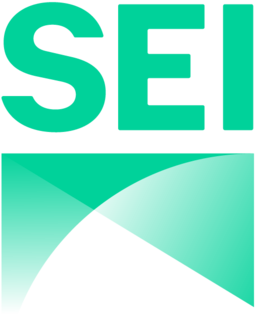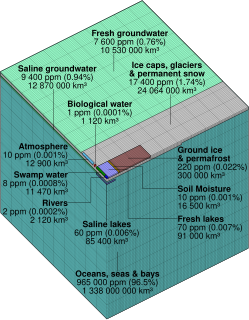
The United Nations Environment Programme (UNEP) is responsible for coordinating responses to environmental issues within the United Nations system. It was established by Maurice Strong, its first director, after the United Nations Conference on the Human Environment in Stockholm in June 1972. Its mandate is to provide leadership, deliver science and develop solutions on a wide range of issues, including climate change, the management of marine and terrestrial ecosystems, and green economic development. The organization also develops international environmental agreements; publishes and promotes environmental science and helps national governments achieve environmental targets.

The International Union for Conservation of Nature is an international organization working in the field of nature conservation and sustainable use of natural resources. It is involved in data gathering and analysis, research, field projects, advocacy and education. IUCN's mission is to "influence, encourage and assist societies throughout the world to conserve nature and to ensure that any use of natural resources is equitable and ecologically sustainable".
The United Nations Global Compact is a non-binding United Nations pact to encourage businesses and firms worldwide to adopt sustainable and socially responsible policies, and to report on their implementation. The UN Global Compact is a principle-based framework for businesses, stating ten principles in the areas of human rights, labor, the environment and anti-corruption. Under the Global Compact, companies are brought together with UN agencies, labor groups and civil society. Cities can join the Global Compact through the Cities Programme.
The International Social Science Council (ISSC) was an international non-governmental organization promoting the social sciences, including the economic and behavioural sciences. It was founded in Paris, France between 6 and 9 October 1952, under the auspices of UNESCO, following a Resolution at the 6th UNESCO General Conference in 1951. It was adopted on 19 September 1972, completed and revised on 14 November 1979, and underwent multiple revisions on 17 December 1985, 3 December 1992, 27 November 1998, 8 November 2006, and finally 10 December 2010. ISSC is registered in accordance with French Law.
The Deutsche Gesellschaft für Internationale Zusammenarbeit (GIZ) GmbH, often shortened to simply GIZ, is the main German development agency headquartered in Bonn and Eschborn that provides services in the field of international development cooperation and international education work. It is the organization's self-declared goal to deliver effective solutions that offer people better prospects and sustainably improve their living conditions.

The International Solid Waste Association (ISWA) is a non governmental, independent and non-profit association by statutes and follows the mission statement to promote and develop professional waste management worldwide as a contribution to sustainable development.

The Stockholm Environment Institute, or SEI, is a non-profit, independent research and policy institute specialising in sustainable development and environmental issues, with seven affiliate offices around the world. SEI works on climate change, energy systems, water resources, air quality, land-use, sanitation, food security, and trade issues with the aim to shift policy and practice towards sustainability.

Integrated water resources management (IWRM) has been defined by the Global Water Partnership (GWP) as "a process which promotes the coordinated development and management of water, land and related resources, in order to maximize the resultant economic and social welfare in an equitable manner without compromising the sustainability of vital ecosystems".
The Group on Earth Observations (GEO) coordinates international efforts to build a Global Earth Observation System of Systems (GEOSS). It links existing and planned Earth observation systems and supports the development of new ones in cases of perceived gaps in the supply of environment-related information. It aims to construct a global public infrastructure for Earth observations consisting in a flexible and distributed network of systems and content providers.

Partnerships in Environmental Management for the Seas of East Asia (PEMSEA) is a regional partnership programme implemented by the United Nations Development Programme (UNDP) and executed by the United Nations Office for Project Services (UNOPS). The project, started in 1994, was originally known as Prevention and Management of Marine Pollution in the East Asian Seas (SDS-SEA).
Environmental governance is a concept in political ecology and environmental policy that advocates sustainability as the supreme consideration for managing all human activities—political, social and economic. Governance includes government, business and civil society, and emphasizes whole system management. To capture this diverse range of elements, environmental governance often employs alternative systems of governance, for example watershed-based management.

The European Centre for Nature Conservation (ECNC) was a Dutch non-profit foundation which was active in the field of European nature and biodiversity policy between 1993 and 2017. It was set up as a network of university departments, expert centres and government agencies and operated as a European biodiversity expertise centre. The organization promoted sustainable management of natural resources and biodiversity, and aimed to stimulate interaction between science, society and policy.

Dionysia-Theodora Avgerinopoulou is a politician regarding environmental matters, a specialized attorney in International, Environmental and Sustainable Development Law, and the recipient of the Green Star Award awarded by UNEP, OCHA, and Green Cross International for her leadership in prevention, preparedness and response to environmental emergencies.
Type II partnerships were developed at the Johannesburg World Summit on Sustainable Development in 2002. Arising in opposition to the state-centred eco-governmentality of previous approaches to sustainable development policy, the partnerships facilitate the inclusion of private and civil actors into the management of sustainable development. The partnerships are employed alongside traditional intergovernmental mechanisms in order to effectively implement the United Nations' Agenda 21 and Millennium Development Goals, particularly at sub-national level. Although widely acknowledged as one of the most innovative and effective developments in global environmental governance in recent years, the partnerships have faced criticism due to fears of a lack of accountability, and the risk that they may exacerbate inequalities of power between Northern and Southern states. Despite these reservations, there is a general consensus among state and non-governmental actors that Type II partnerships are a significantly progressive step in global environmental governance in general, and sustainable development discourse in particular.
Soil governance refers to the policies, strategies, and the processes of decision-making employed by nation states and local governments regarding the use of soil. Globally, governance of the soil has been limited to an agricultural perspective due to increased food insecurity from the most populated regions on earth. The Global Soil Partnership, GSP, was initiated by the Food and Agriculture Organization (FAO) and its members with the hope to improve governance of the limited soil resources of the planet in order to guarantee healthy and productive soils for a food-secure world, as well as support other essential ecosystem services.

Coastal & Marine Union (EUCC) is a nonprofit organization with a membership of around 500 institutions, NGOs and experts, in 40 countries. Its network at large involves about 2500 professionals involved in coastal and marine management issues. Founded in 1989 with the aim of promoting coastal management by bridging the gap between scientists, environmentalists, site managers, planners and policy makers, it has grown into the largest network of coastal practitioners and experts in Europe, with 13 National Branches, an International Secretariat in Leiden, and offices in Barcelona (Spain), Biarritz (France), Warnemünde (Germany), Szczecin (Poland), Klaipeda (Lithuania) and Sliema (Malta). EUCC's working area is Europe and its neighbouring regions, especially the Black Sea and the Mediterranean.

The Sustainable Mekong Research Network (SUMERNET) is a network of organizations committed to the sustainable development of the Greater Mekong Region. Launched in 2005, SUMERNET supports policy-relevant research and outreach activities to inform and engage policy-makers, planners and stakeholders. Within this context, it pursues an evolving agenda in response to questions and policy issues that arise in the region. Current research themes are climate-compatible development, regional economic integration, and ecosystem services and local development. The network works on a range of issues including natural ecosystems governance, floods and natural disasters, climate change and adaptation, and transboundary resource flows.

Western Indian Ocean Marine Science Association (WIOMSA) is a regional professional, non-governmental, non-profit, membership organization, registered in Zanzibar, Tanzania. The organization is dedicated to promoting the educational, scientific and technological development of all aspects of marine sciences throughout the region of Western Indian Ocean, with a view toward sustaining the use and conservation of its marine resources. The association has about 1000 individual members as well as about 50 institutional members from within and outside the region.
The United Nations University Institute for Integrated Management of Material Fluxes and of Resources (UNU-FLORES), established in 2012, is one of the 13 institutes that make up the United Nations University (UNU) — a global think tank and postgraduate teaching organisation headquartered in Tokyo, Japan.
The United Nations Development Programme (UNDP) in South Africa is one of the 177 offices of the UNDP’s global networks located in the country's capital, Pretoria. Its vision is to empower people's lives and help nations to become stronger and more resilient. As a part of the wider UNDP's development efforts, the local office is responsible for supporting the government to develop and implement policies to accelerate the attainment of the Sustainable Development Goals (SDG) in South Africa. UNDP interventions in South Africa focus on promoting actions that contribute to address the triple challenge of inequality, poverty and unemployment that the county faces. In that regard, the interventions include the promotion of youth employment; building resilience to climate change impacts; biodiversity conservation; water management; promotion of access to sustainable, clean and affordable energy; and promotion of citizens participation in democratic processes. Leaving no-one behind, gender mainstreaming and innovation are in the center of all UNDP cooperation.











